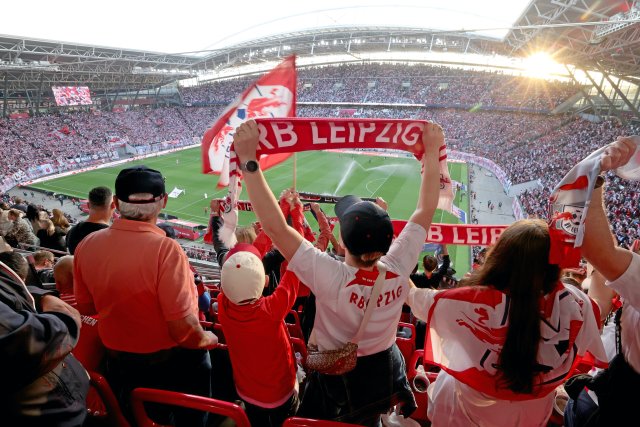In the future, less affluent families will be pushed to the bottom by RB Leipzig thanks to significant price increases.
Photo: dpa/Jan Woitas
When Borussia Dortmund visits RB Leipzig this Saturday afternoon, hardly a seat in the Leipzig stadium, which has a capacity of over 47,000 spectators, will be left empty. The game has been sold out for weeks – and in a game as explosive from a sporting and fan perspective as against BVB, with a few exceptions, everyone who has purchased a ticket will actually come. However, this is not the case in every Leipzig game. When the opponents in the Bundesliga are Mainz 05, VfL Bochum or Darmstadt 98, thousands of places have remained empty in the past. Too many fans bought season tickets and then let them expire unused again and again when the opponent wasn’t attractive enough, the weather was bad or the kick-off was too late, or when something more important simply came up. RB Leipzig has now reacted to this in a highly controversial way and has turned some supporters against them.
On average, 13 percent of Leipzig fans who purchased tickets this season let them expire. In games like those against BVB, this so-called no-show rate is in the low single-digit range; against less well-known opponents is correspondingly higher, so that almost a fifth of the stadium remains empty even though it is officially sold out. In order to minimize the no-show rate, the club has introduced a minimum use of season tickets for at least ten games for the new season. Otherwise this will be withdrawn. This ensured approval among the organized RB fans, after all, the stadium should not only be full against the top clubs.
nd.Kompakt – our daily newsletter

Our daily newsletter nd.Compact brings order to the news madness. Every day you will receive an overview of the most exciting stories from the world editorial staff. Get your free subscription here.
However, there were protests because the club, which was run like a company, also massively raised prices where the no-show rate was highest. This particularly affects sector D, the second fan block in the north curve, which was also established as a family fan block. Tickets for adults have been increased by almost 200 euros per season to 525 euros. Children no longer pay 91 euros as before, but 235 euros – a price increase of more than 130 percent. A family of four with two children under 14 now no longer has to shell out 844 euros per game year for the blocks next to the guest area, but 1,520 euros – almost double.
RB justifies this primarily by saying that the seats in the lower tier have previously been too cheap and a price increase has been planned for a long time. Fan committees were also involved in this planning in advance. But the RB fan association announced that its representative had unfortunately not been able to prevent the massive price increase in this area. “As long as people have less in their wallets, as in the structurally weak region of Central Germany, we can perhaps compete with top teams in sports, but we should not try to do this with the income from stadium goers,” says the statement from the fan representatives.
For affected fans like Jörn Kalbitz, the strategy of gradually dissolving the second fan block through the price offensive is a nuisance. The theater dramaturg, whose job is to keep a close eye on social changes, reports on people sitting next to him who, after more than ten years of loyalty, simply can no longer afford the ticket. These are individual fates, “but these people are missing because their hearts were in it,” says Kalbitz. “This is classic gentrification; the people who can no longer afford it have to move or simply leave.”
The people of Leipzig know something similar from the popular residential areas of the trade fair city, where rents are through the roof. In the stadium, the increase primarily affects older fans and families who are not financially strong. At RB it is only cheap in the standing block and under the roof; The Champions League participants will be asking the rest of the visitors in the home areas to pay heavily in the future, 15 years after the club was founded. The increase is intended to increase the value of the tickets, which – according to the club’s logic – are no longer simply allowed to expire given the prices.
Spontaneous protests broke out at the last home game against Wolfsburg. Thousands of fans in Sector D stayed away from their seats and stood behind the blocks even after kick-off. They protested with whistles and only came into the stadium after twelve minutes. RB has already experienced dozens of fan boycotts, but so far only from opposing supporters. The fact that some of our own supporters are on strike is new. The active fans in the 11,000-person standing block opposite showed solidarity against the pricing policy with several banners.
Kalbitz would have liked a more differentiated price adjustment. He finds it incomprehensible that fans like him, whose seats have hardly ever remained empty in all these years, now have to pay the bill for others coming too rarely. The price increase feels like a collective punishment for these long-term visitors. “I find it strange that RB offends exactly these people,” he says. “On the one hand, RB Leipzig wants fans who come regularly, but it’s just becoming more expensive for them,” he warns. Supporters who attend at least 16 of 17 home games next season will have 50 percent of the price increase waived – but only as a credit when purchasing a season ticket for the season after next.
An online petition against the increase already has more than 2,500 signatures and will soon be handed over to the club. The fan representatives have now also signaled a renewed need for discussion. RB listens to the complaints, but the association, which is led by only 23 voting members, says that the measures are the result of an intensive, year-long process; The new price categories had been planned for a long time and are now not being changed. It looks like the Champions League participant is going through with the price increases as planned.
The coming season will show whether the supporters’ ability to suffer has been reached or already exceeded with the new prices, criticized the fan association: “Once again we urge you not to view stadium visitors as just a business case. In the future, the attractiveness of the entire product also suffers from an empty stadium.«
The consequences for lawn ball sports are still manageable. When asked, the club announced that around 400 fans from Sector D are now moving to the cheaper upper tiers. 500 more had their season tickets canceled; more than 100 of them from that expensive area. Jörn Kalbitz and his five-member fan group are now moving to the upper tier on the other side of the stadium. There the card costs about the same as before on the other side in the lower tier in the third row.
He would have also paid the new price. But the 49-year-old and his companions no longer want to sit where the old neighbors have been pushed out and where a more affluent clientele that changes every game day will in the future take their seats. For him and many others, the games against Dortmund and Bremen in the last home game of the season will be a farewell to their usual stadium perspective and dear acquaintances after ten years.
Become a member of the nd.Genossenschaft!

Since January 1, 2022, the »nd« will be published as an independent left-wing newspaper owned by the staff and readers. Be there and support media diversity and visible left-wing positions as a cooperative member. Fill out the membership form now.
More information on www.dasnd.de/genossenschaft
link sbobet sbobet link sbobet judi bola online
